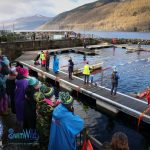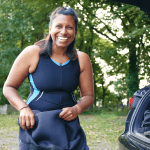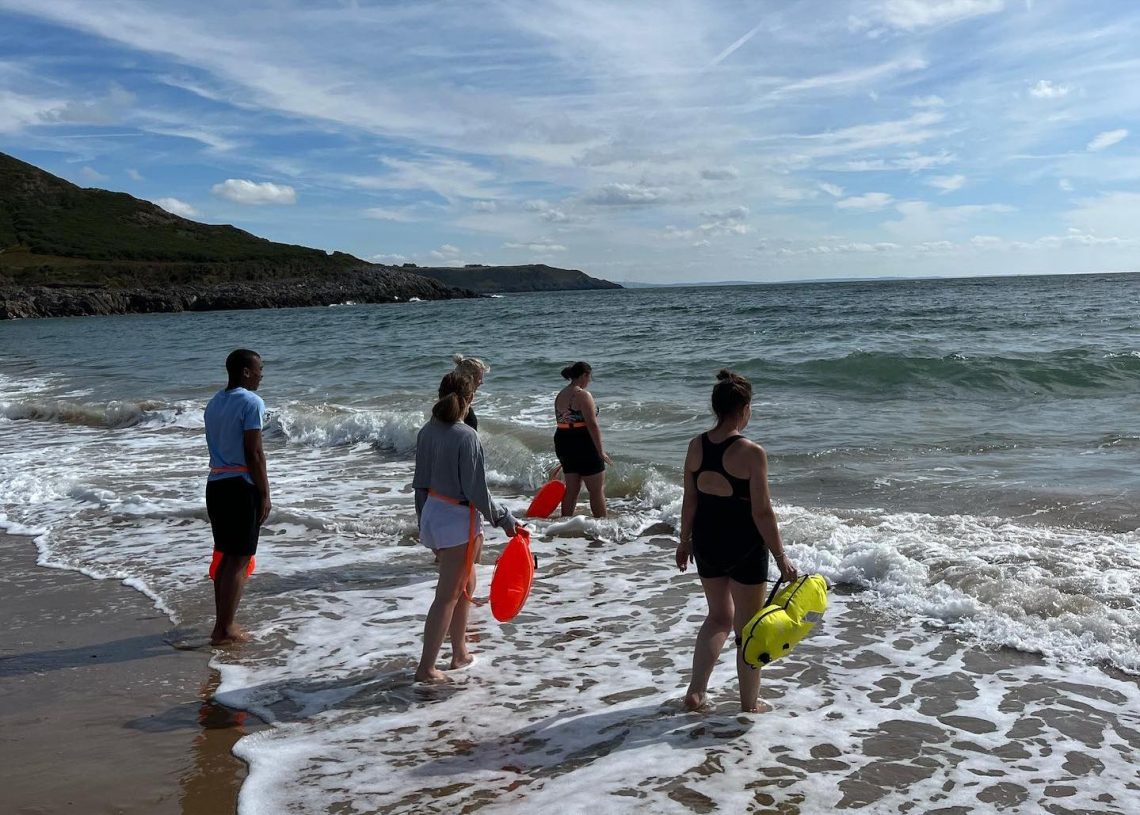
Healing waters: a new wave of social prescribing
Last summer, a pioneering social prescribing project in South Wales saw a group of young people, diagnosed with a first episode of psychosis, experience the therapeutic benefits of outdoor swimming
Sioned Thomas is the Outdoor Activity Development Officer for The Outdoor Partnership, an organisation that enhances people’s loves through outdoor activities.
Last summer, Sioned led a social prescribing project for young people diagnosed with a first episode of psychosis, who are supported by the mental health charity Adferiad Recovery. According to the NHS, social prescribing is “an approach that connects people to activities, groups, and services in their community to meet the practical, social and emotional needs that affect their health and wellbeing.”
Sioned’s six-week program involved taking the group of young people (aged 16 to 30) to explore the outdoors in South Wales, based around the theme of water. This included exploring the coastal paths of Gower, swimming in the sea and dipping in the waterfalls of the Brecon Beacons, all guided by outdoor instructors.
A keen swimmer herself, Sioned hopes this pilot project will spawn similar social prescribing programs in South Wales and beyond. We spoke to Sioned about how she feels the project went, and why she hopes outdoor swimming will become an integral part of social prescribing for health and wellbeing.
Sioned, can you tell me a bit more about the young people you worked with, and the challenges they have faced with their mental health?
I worked specifically with young people referred to ‘The Early Intervention in Psychosis Service’. They are supported by Adferiad Recovery. I knew nothing about psychosis before I started – the charity’s practitioners explained to me that usually with psychosis for a young person, they can have just one episode of psychosis that’s brought on by a trauma in their lives. It doesn’t mean you have psychosis; it can just mean you’ve had a psychotic episode and you might never actually have one again.
It was a tricky stage for them because a lot of them were trying to determine what kind of treatment they needed. Some were quite far ahead on the path and knew they probably do have psychosis and will always have it, while others were more early on their pathway to working out why they had an episode. So it was a mentally draining time for many of them.

What inspired you to incorporate outdoor swimming as well as hiking and bushcraft into the program?
Swimming is my background. I was a competitive pool swimmer when I was younger, and more recently I’ve done some open water events and competitions. I also love just dipping with friends and exploring different bodies of water.
The community side of outdoor swimming is great; the feeling as mad as everybody else, giggling and jumping in the waves. And then there’s that other element of actually escaping everyone else. Especially in winter, when you leave the busy beach behind and go into the sea where there’s barely a soul.
Even if you feel you don’t want to go in today; you don’t want to get your hair wet and get sand everywhere or you just can’t be bothered, you always feel better when you’ve done it. You feel so powerful, so strong. For me, when I’ve had that outdoor swim, I feel like I’m in control.
These young people on the program definitely felt out of control and overwhelmed in a lot of elements of their lives. They’ve have to drop out of college or school; some weren’t allowed to drive or they had to work part time instead of full time because they were unregulated with their episodes.
I didn’t want to force the group into the water, but I did want them all to experience it just once, and if they didn’t like it, that was totally fine. I think even finding that quiet space around water, whether just sitting next to it, walking near it, reading a book or listening to some music – it provides a calming space.
For those that went in the water, how did they find the experience?
In the second week we had a dip in the Gower. It was lovely and calm. We brought tow floats so they could lie back and rest their heads. When they saw how relaxed they could be in the water just by regulating their breathing and acclimatizing properly, I think they realized it doesn’t need to be that shock, that it can happen really slowly. Rather than being exciting or stressy, it can be a calming experience.
Later we dipped in rivers and waterfalls. In their feedback some said they preferred dipping in the sea while others preferred the waterfalls. I really liked that they started forming their own opinions of where they prefer to dip because anyone who’s an open water swimmer usually has their favourite place to swim, or places they really don’t want to swim at all. And I thought that if they started forming opinions on this, it might mean they carry on and do it longer term.
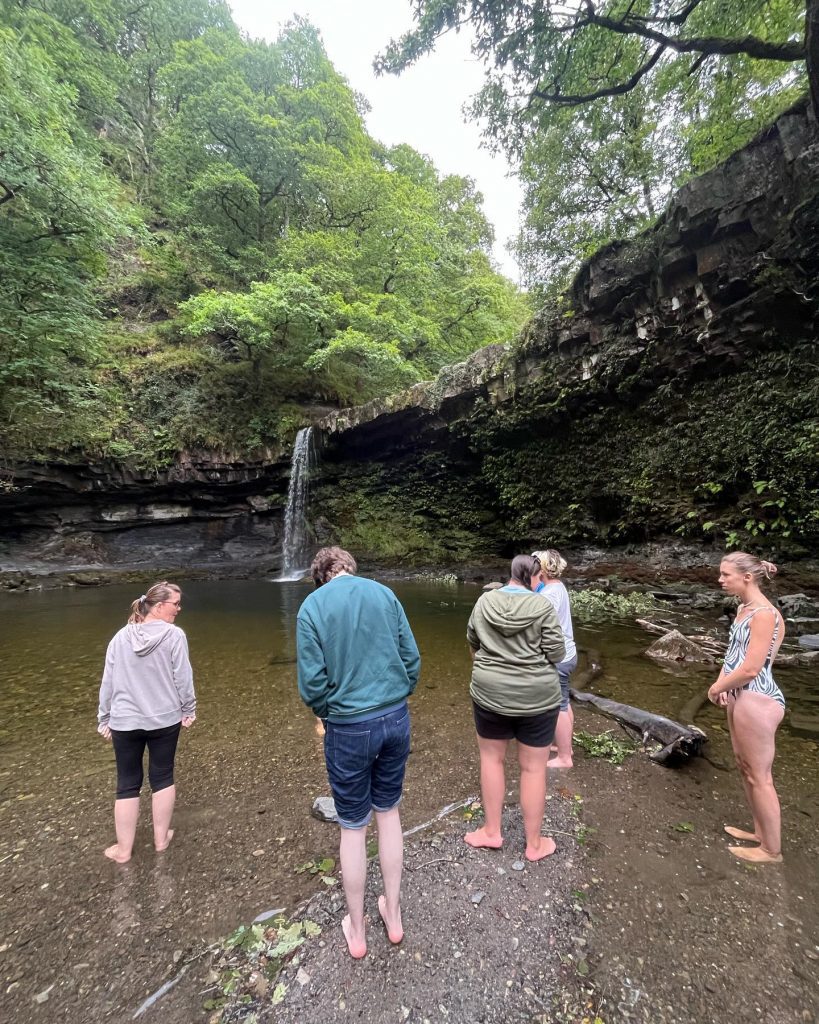
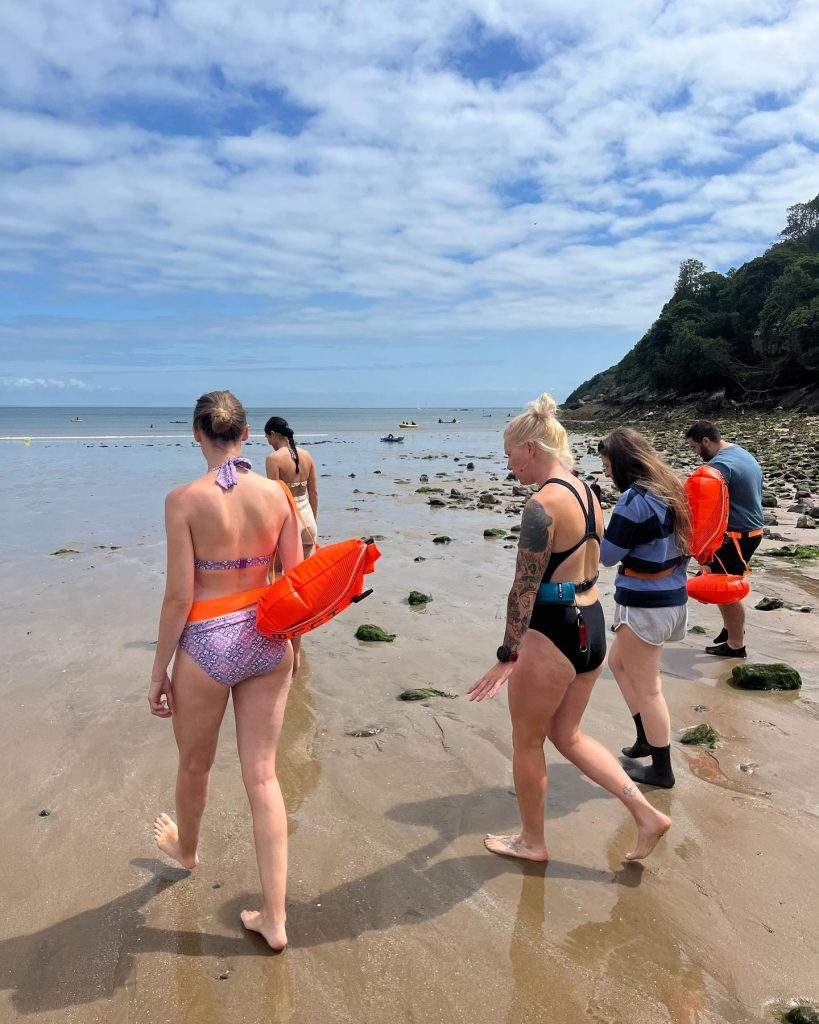
Was there a highlight for you during the program?
Yes, in the final week when one of the young people was adamant he wasn’t going to go in the sea. He hadn’t even brought his swimming kit. I think when he saw the others messing around and enjoying themselves in the waves, he decided he was more than happy to go in in the boxers he was wearing. I think that was quite powerful because he made that decision all by himself.
What have been the outcomes of this social prescribing project?
Part of the feedback we had was that after the program had finished, the young people were going to their group therapy sessions a lot more open. They would start a conversation with each other, “Oh, do you remember when we went to that place…” and then it would go from there.
Those six weeks together gave them common themes meant to talk about when previously, all they had to talk about before was, “Oh, you have psychosis? Yeah, I have psychosis, too. It’s really shit.”
We ate outdoors, cooked our soup over a fire, did bushcraft. We were in a space that wasn’t a white room with no windows, two chairs facing each other, having a really awkward conversation. We were sitting around a fire or on the beach.
It was nice to see the young people in those downtime moments, not reaching for their phones because they wanted to help light the fire or set up for the swimming session. And that happened organically, without forcing it.
Was there anything surprising or unexpected that arose during those few weeks?
Yes, and it’s something that I’d actually like to tie into a future program.
We went to the waterfalls in Ystradfellte and there was a lot of rubbish up there. Many of the young people in the group were appalled by it. Our guide had a spare rubbish bag in his rucksack and said to the group they were welcome to pick any litter up if they wanted to, and they did. They were happy to do it.
It got me thinking that for the next program, it would be really nice to have a sustainable element – to promote safe use of fires, how to dispose of things properly, etc. The participants could be advocates for leaving areas as they found it, or better. It’s all about education. If you do want to light a fire, that’s great, but how can we do it in a way that doesn’t leave massive burnt patches everywhere?
We’re very quick to blame young people for a lot of things but actually, I do think young people these days are a lot more forward thinking. They shop in charity shops, buy plastic-free products and think about what they’re buying.
What’s next on The Outdoor Partnership’s social prescribing horizons?
The plan is to extend the program to different counties, and to incorporate new elements, including sustainability and the environment. We’ve linked with marine wildlife charities and outdoor guides that do rock-pooling an snorkelling, so there’ll still be that water element in the activities.
You must love your job!
My job is fun because I know how much the outdoors give me. I wasn’t outdoorsy as a child at all. I was sporty and did a lot of swimming, but in a very nice, warm, clean swimming pool. I got into the outdoors a lot later on in life. So I can understand how the outdoors can cause anxiety for a lot of people, that it can be quite daunting. You might worry about not having the right kit; that it’ll be cold and wet and you just can’t be bothered.
I understand those feelings because I still feel like that sometimes. But then when you’re out there, you might get that lovely sunrise or sunset, or it might rain while you’re swimming in the sea, and it’s such a lovely feeling isn’t it?
Discover more about The Outdoor Partnership’s inspiring work at outdoorpartnership.co.uk and follow them on Facebook and Instagram.
Click here to read more about how outdoor swimming can benefit mental health.
To see all the online content from the April 2023 issue of Outdoor Swimmer, visit the 'Underwater' page.





